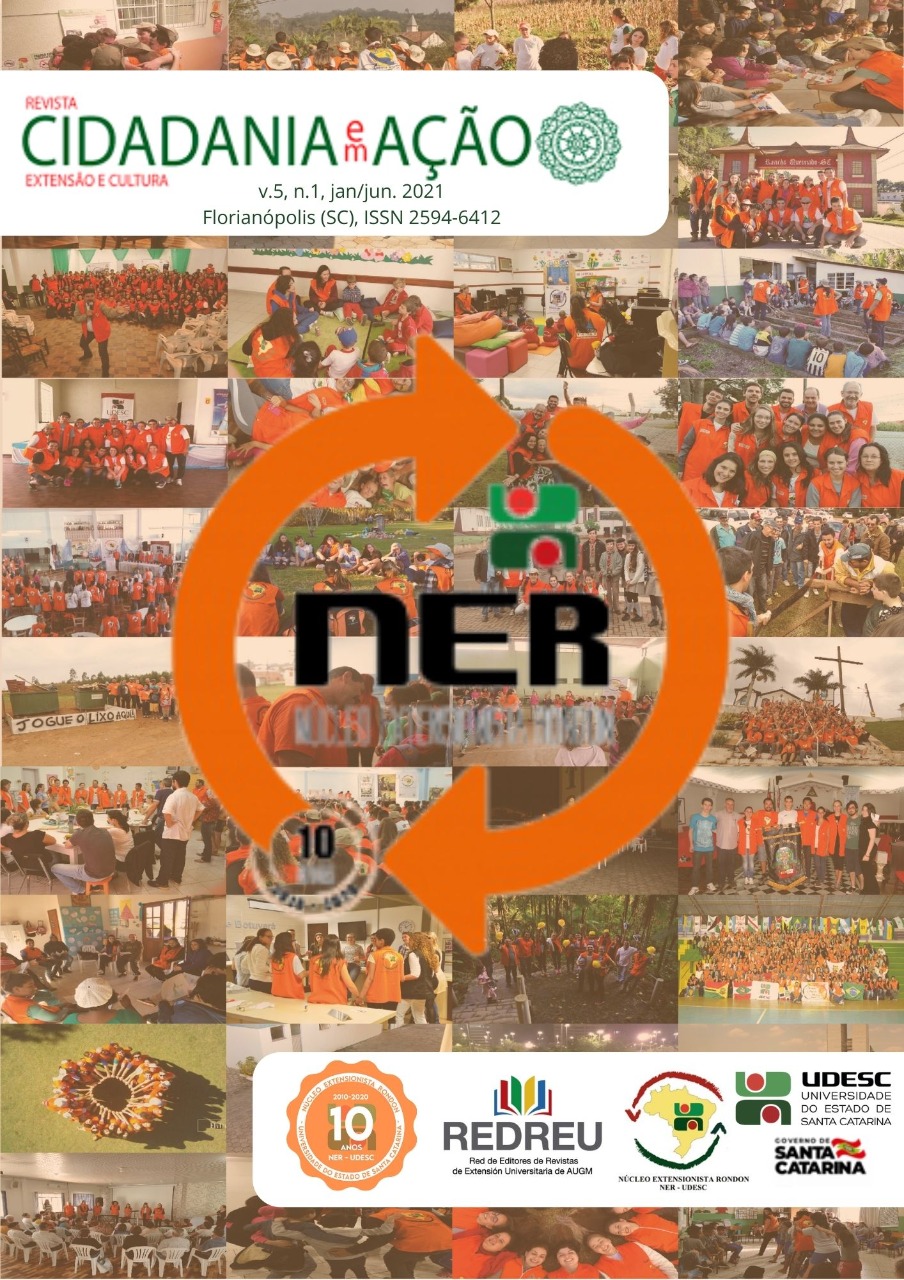EXPERIENCIAS NEABIANAS EN EL CENTRO EXTENSIONISTA DE RONDON
CONTRIBUCIONES DEL CENTRO DE ESTUDIOS AFROBRASILEÑOS NEAB/UDESC
DOI:
https://doi.org/10.5965/2594641205012021070Palabras clave:
Barreras, Innovación social, NER-UDESCResumen
El objetivo del estudio es identificar las barreras en el desarrollo de la innovación social, desde el Núcleo Extensionista Rondon (NER-UDESC). En un enfoque cualitativo, las entrevistas y los grupos focales se realizaron con actores involucrados en el proyecto. Los resultados apuntan a diversas barreras en el desarrollo de la innovación social, como la escasez de recursos financieros, la falta de compromiso de poder público, la falta de apoyo institucional, los acuerdos interorizacionales limitados, los gustos de conocimiento y la comunicación, la resistencia al cambio y las limitaciones de los recursos físicos del personal. Teniendo en cuenta el potencial del NER-UDESC en ser un instrumento para crear conexiones duraderas con los municipios, lo que permite la integración de la sociedad universitaria, se espera que este estudio ayude a los responsables de la política en la toma de decisiones, estimulando el desarrollo de políticas, las colaboraciones intersectoriales y los modelos de colaboración para Innovación y bienestar social.
Descargas
Citas
CAULIER-GRICE, J.; KAHN, L.; MULGAN, G.; PULFORD, L.; VASCONCELOS, D. Study on social innovation. The Social Innovation exchange (SIX) and the Young Foundation for the Bureau of European Policy Advisers. Bureau of European Policy Advisers, Young Foundation., 2010, p. 127.
CHALMERS, D. Social innovation: An exploration of the barriers faced by innovating organizations in the social economy. Local Economy, 2013, 28(1), 17-34.
CUNHA, J.; BENNEWORTH, P. Universities” contributions to social innovation: towards a theoretical framework. In EURA Conference, 2013.
DHONDT, S.; OEIJ, P. R. A.; SCHRÖDER, A. Resources, constraints and capabilities. Atlas of Social Innovation. New Practices for a Better Future. Sozialforschungsstelle, TU Dortmund University. Dortmund, 2018.
DOMANSKI, D.; KALETKA. Social Innovation Ecosystems. Atlas of Social Innovation. New Practices for a Better Future. Sozialforschungsstelle, TU Dortmund University. Dortmund, 2018.
EUROPEAN COMMISSION. Social Innovation, a decade of change. 2014.Disponível em: http://espas.eu/orbis/document/social-innovation-decade-changes. Acesso em: 25 abr. 2018.
FORPROEX - Fórum de Pró-Reitores de Extensão das Universidades Públicas Brasileiras. Plano Nacional de Extensão Universitária. 2012. Disponível em: https://www.ufmg.br/online/arquivos/anexos/PNEU.pdf. Acesso em: 25 abr. 2020.
HOWALDT J.; KALETKA C.; SCHRÖDER A.; REHFELD D.; TERSTRIEP J. Mapping the World of Social Innovation. A global comparative analysis across sectors and world regions. Social Innovation: Driving Force of Social Change, 2016.
HOWALDT, J.; BUTZIN, A.; DOMANSKI, D.; KALETKA, C. Theoretical approaches to social innovation-a critical literature review. A deliverable of the project:”Social Innovation: Driving Force of Social Change”(SI-DRIVE). Dortmund: Sozialforschungsstelle, 2104.
LETTICE, F.; PAREKH, M. The social innovation process: themes, challenges and implications for practice. International Journal of Technology Management, 2010, 51(1), 139-158.
MULGAN, G. The process of social innovation. Innovations: technology, governance, globalization, 2006, 1(2), 145-162.
MULGAN, G.; TUCKER, S.; ALI, R.; SANDERS, B. Social innovation: what it is, why it matters and how it can be accelerated. 2007.
MURRAY, R.; CAULIER-GRICE, J.; MULGAN, G. The open book of social innovation. London: National endowment for science, technology and the art. 2010.
PHILLS, J. A.; DEIGLMEIER, K.; MILLER, D. T. Rediscovering social innovation. Stanford Social Innovation Review, 2008, 6(4), 34-43.
RICHARDSON, R. J. Pesquisa social. São Paulo: Atlas, 3, 1999.
UDESC. Sítio da Universidade Estadual de Santa Catarina. Disponível em: https://www.udesc.br/nucleorondon. Acesso em: 25 abr. 2020.
YIN, R. K. Estudos de caso: planejamento e métodos. Porto Alegre: Bookman, 2005.
Descargas
Publicado
Cómo citar
Número
Sección
Categorías
Licencia
Derechos de autor 2021 Ciudadanía en Acción: Revista Extensión y Cultura

Esta obra está bajo una licencia internacional Creative Commons Atribución 4.0.












